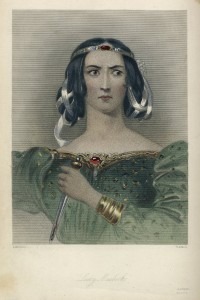 “Minors of the Majors” invites you to discover compositions by the great classical composers that for one reason or another have not reached the musical mainstream. Please enjoy, and keep listening!
“Minors of the Majors” invites you to discover compositions by the great classical composers that for one reason or another have not reached the musical mainstream. Please enjoy, and keep listening!
Richard Strauss’s monumental tone poems are the central musical expressions of the Austro-German tradition at the turn of the century. These highly innovative orchestral works—ranging from Macbeth of 1888 to the Sinfonia domestica of 1903—with Eine Alpensinfonie added in 1915—project youthful confidence and virility in its music handling, but also in subject matters. Macbeth, composed between 1886 and 1888, failed to find its place in the concert repertory because “it lacked the thematic cogency and convincing pacing of musical events so evident in his subsequent tone poems.” Strauss revised this composition more thoroughly than any other of his works. Nevertheless, the composer subsequently viewed this composition as a musical statement of independence, “asserting the primacy of the literary and dramatic logic over the formal, classical compositional strategies.” In terms of content, Strauss does not attempt to cover the entire Shakespearean drama, but musically focuses on three main elements of the play. A brief fanfare prepares for the entrance of the musical theme representing Macbeth. Soaring horns and trumpets provide the musical evidence of his regal arrogance, and lower winds and strings account for his mounting ambition. Introduced by flutes and clarinets over a sustained horn pedal, the theme for Lady Macbeth gradually emerges. In the score, Strauss introduced Lady Macbeth with the following words: “That I may pour my spirits in thine ear, and chastise with the valour of my tongue, all that impedes thee from the golden round…” With the principle materials introduced, the first episode details a contentious dialogue between Macbeth and his wife that quickly rises to a climax. King Duncan, whose murder has been planned by the Macbeths approaches as the strings provide a fleeting introduction to the second episode. Musically associated with Lady Macbeth, a royal procession announced the arrival of King Duncan. As the music becomes more animated, Duncan is murdered and the guilty pair is now forever haunted by their conscience. As Lady Macbeth’s music becomes increasingly fragmented, Macbeth himself faces defeat as the distant drums and fanfares signal the approach of Malcom and Macduff.
Richard Strauss: Macbeth, Op. 23
You May Also Like
- Minors of the Majors
Gustav Holst: Ave Maria Primarily known for his vastly influential orchestral compositions, Gustav Holst (1874-1934) nevertheless composed a wide variety of moving choral works. - Minors of the Majors
Anton Bruckner: Abendzauber (Evening magic) Unlike his compatriot Gustav Mahler, Anton Bruckner wrote a considerable quantity of choral music. - Minors of the Majors
Darius Milhaud: Sonatina for clarinet and piano, Op. 100 In his mid-20’s, Darius Milhaud was already an international musical superstar! - Minors of the Majors
Gabriel Fauré: Cantique de Jean Racine, Op. 11 Gabriel Fauré (1845-1924) was a revered teacher and a proactive administrator on behalf of music.
More Anecdotes
- Bach Babies in Music
Regina Susanna Bach (1742-1809) Learn about Bach's youngest surviving child - Bach Babies in Music
Johanna Carolina Bach (1737-81) Discover how family and crisis intersected in Bach's world - Bach Babies in Music
Johann Christian Bach (1735-1782) From Soho to the royal court: Johann Christian Bach's London success story - A Tour of Boston, 1924
Vernon Duke’s Homage to Boston Listen to pianist Scott Dunn bring this musical postcard to life
